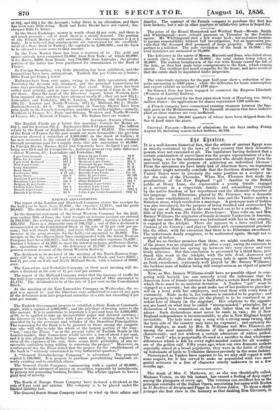ft4t tOtatrfs.
IT is a well-known historical fact, that the artists of ancient Egypt were so strictly restrained by the laws of their country that their inventive powers were not exercised at all. The legislature having declared that a certain combination of curve-lines was the proper representation of a hu- man being, wo to the unfortunate innovator who should depart from -the universal type for the purpose of achieving an individual likeness ! From the specimens we have lately had of American farce, an ingenious- speculator might naturally conclude that the facetious dramatists of the United States were in precisely the same position as a sculptor un- der the rule of the Pharaohs. When Mrs. Florence first made the peculiarities of the New England " gal " familiar to the British public at Drury Lane, she represented a Tow% female engaged as a servant in a respectable family, and astonishing everybody by the native freedom of her deportment and the idiomatic character of
her language. An Hibernian, played by Mr. Florence, was a domestic on the same establishment ; and between him and the Yankee maiden a flirtation arose, which resulted in a marriage. A grotesque man of fashion was also introduced, for the purpose of being insulted and overreached by the fair one of Maine, and in the end turned out to be a swindler. The
title of this work was The Yankee Housekeeper. Time rolls on, and Mrs,.
Barney Williams, the originator of female dramatic Yankeeism in America, though her sister Mrs. Florence was beforehand with her in this country,
is engaged at the Adelphi. There she appears in a farce entitled The Customs of the Country; and plays a Yankee girl, circumstanced precisely like the other, with the exception that there is no Hibernian sweetheart. The unfortunate dandy reappears, to be maltreated again, though not so severely a:s' before.
Had we no further premises than these, we might conclude that one of the pieces was an original and the other a copy, owing its existence to the competition that has sprung up between two very clever and very
lively actresses. But this conclusion is prevented by a third farce, pro- duced this week at the Adelphi, with the title Irish Assurance and Yankee Modesty. Here the knowing young lady is again blessed with an Irish sweetheart, (extremely well played by Mr. Barney Williams,) the luckless man of fashion being still conspicuous as an object of general execration.
Now, as Mrs. Barney Williams could have no possible object in com- peting with herself, one can scarcely avoid the inference that the American farce of female interest is built after a certain fixed model, from which there must be no material deviation. A Yankee " gal" must be engaged as a servant ; but she must make use of her position to place her- self on a level with her employers, and treat them with every form of contumely. Rude as she is, her rudeness is intended to be popular ; and her propensity to take liberties (in the plural) is to be construed as an ardent love of liberty (in the singular). Her relations to the opposite sex are based on what may be called "strong-minded " principles, for a declaration of love commences on her side rather than on that of her adorer. Such declarations must never be made in vain; for if New England independence is insurmountable, so also is New England beauty irresistible. The lady must sing a song with a strong nasal twang, that
the 1 'c side of the country may have its exponent ; and certainly the vocal displays, as made by Mrs. B, Williams and Mrs. Florence, are among the most agreeable features of the performance,—admirably characteristic, and not without a certain admixture of native pathos. The " swell " who is perpetually ill-used is a sacrifice to that wholesome abhorrence which is felt by every right-minded nation for all worship-
ers of the golden calf. Fifty years ago, when our own dramatic authors especially aimed at a broad popularity, they were in the habit of offering
up holocausts of lords to Yorkshire farmers precisely in the same fashion. Stereotyped as Yankee farce appears to be, we may still regard it with some respect, for it has served to make us acquainted with two most genial actresses in a line of character utterly unknown to us a few months ago.


























 Previous page
Previous page